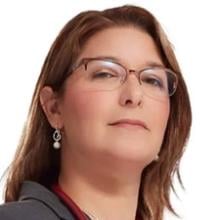About 27% of U.S. adults have a disability of some sort according to the Centers for Disease Control and Prevention (CDC), but only 3% of the nation’s physicians report having one, according to a study in JAMA Network Open.
“In medicine, there’s still such a stigma with having a disability that there are a lot of people probably who don’t speak up,” said Joanna Turner Bisgrove, MD, arguing that there should be a change in thinking.
This means moving away from the medical model of disability that views a disability diagnosis as something wrong that needs to be treated, and instead, going toward the social model of disability that views the diagnosis as an “impairment” and the barriers society creates as the actual disability.
“So my impairment is my hearing loss, but the disability is what keeps me from doing things in society,” she explained. “My hearing impairment doesn’t become a disability unless I’m unable to do my job. So long as I have a scribe, an amplified stethoscope, and my patients wear clear masks, I can do my job as well as anyone else.”
Dr. Bisgrove boils the matter down to always asking people with disabilities one simple question: What do you need?
Dr. Bisgrove, a family physician and AMA member, shared her experience in an episode of the “Stories of Care” podcast presented by the AMA and CDC Project Firstline initiative.
Explore the AMA Ed Hub™ Health Equity Education Center and learn about AMA CME accreditation.
Critical help at the right time
While it may make some uncomfortable to ask people about their disabilities, Dr. Bisgrove has no problems talking about hers.
“This is my life story and part of who I am,” she said.
Born with mild hearing loss in her left ear, Dr. Bisgrove’s condition worsened after contracting viral meningitis when she nine.
After she recovered and returned to school, Dr. Bisgrove nearly failed a standardized test she had previously scored very well on. Her teacher, Mrs. Gurney, suspected lingering physical effects from the viral meningitis could be the reason, and it was discovered that Dr. Bisgrove hadn’t been able to hear her teacher’s instructions when she first took the test.
It was decided that she needed a hearing aid for her left ear, and she got it the same day Chicago held a parade celebrating the Bears’ victory in the 1986 Super Bowl.
“We drove down right before the parade, and it was like they were having a parade for me—for my hearing aid,” Dr. Bisgrove recalled. “It was really cool.”
Overcoming barriers in practice
A member of the AMA Council on Science and Public Health, Dr. Bisgrove spoke about the challenges she has faced in her career—including not being able to read patients’ lips or facial expressions when they were wearing masks during earlier stages of the COVID-19 pandemic.
“So, I’m just carrying on—not even realizing they were talking—and they think I’m interrupting them and being rude,” she said, adding that she saw a drop in her patient-experience scores because of patients thinking she wasn’t paying attention to them.
Fortunately, her scribe was able to help facilitate communication.
“She became my interpreter,” Dr. Bisgrove said.
But Dr. Bisgrove acknowledged this was also an issue pre-pandemic as patients would talk to her when she looked away to type information into the EHR and she didn’t know they were speaking.
It took a fight, but Dr. Bisgrove was able to secure the use of a scribe as an accommodation under the Americans with Disabilities Act.
Explore the AMA’s detailed policy on medical care for people with disabilities, last updated in 2022.
The AMA is listening
Pursuant to policy adopted by the House of Delegates, the AMA is forming an advisory group composed of physicians and medical students with disabilities to develop and promote tools to advocate for themselves in their own workplaces. This includes a “deeper understanding of the legal options available to physicians and medical students to manage their own disability-related needs” in their work environment, the policy says.
AMA members interested in serving on the advisory group should email William Jordan, MD, MPH, director of health equity policy at the AMA Center for Health Equity.
“The disability community is so varied,” Dr. Bisgrove said. “The AMA starting to move forward and listening to physicians with disabilities and other health care professionals with disabilities so that we can be independent on our own is huge.”




